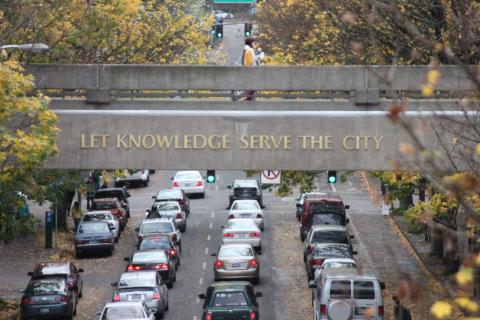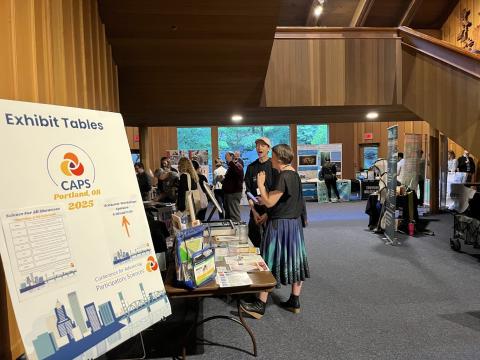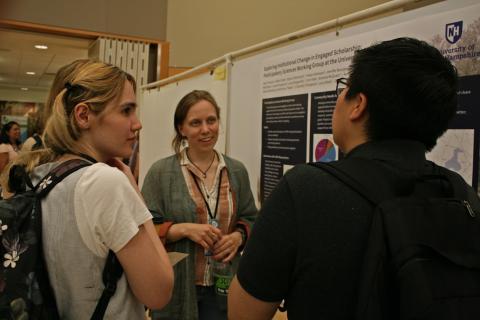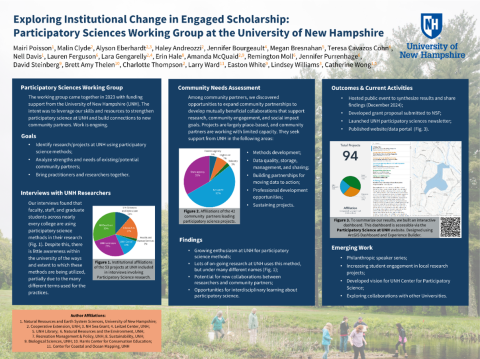Reflections from an attendee at the 2025 Conference for Advancing Participatory Sciences
In May, hundreds of people from around the world came together to discuss Participatory Science, its applications, lessons learned, and the future of the method. This year, five UNH representatives travelled across the country to Portland, Oregon to attend the Conference for Advancing Participatory Sciences, convened by The Association for Advancing Participatory Sciences (AAPS). AAPS has a long history of innovation in the field of citizen and community sciences. Portland was a perfect city to highlight the importance of participatory science – Portland State University’s motto is “Let Knowledge Serve the City”.

The Portland State University motto is emblazoned on a bridge in downtown Portland, Oregon: “Let Knowledge Serve the City”. Portland State University flickr
Conference attendees brought their own expertise and shared their experiences in leading and participating in various projects. As a representative for the UNH Participatory Sciences Working Group (PSWG), I had the opportunity to attend CAPS 2025 as a presenter and booth exhibitor. I started my week with a workshop all about developing volunteer-engaged programs to monitor nocturnal wildlife, led by representatives from the Woodland Park Zoo and Bats Northwest. Even though these organizations are based out of Seattle, I saw many similarities between their program and the NH Bat Counts project led by Haley Andreozzi at UNH Extension and the New Hampshire Fish and Game Department. This theme of shared principles and best practices in developing strong participatory science projects carried on throughout the week.
Talk sessions throughout the week were engaging and informative, with speakers representing projects from the local to the global. Some of my highlights from the week:

Exhibitors at CAPS 2025 - Association for Advancing Participatory Sciences
- Ray Lepore, a volunteer with Parks Tacoma, shared his experience as a community scientist volunteering for the Washington State University Western Redcedar Parks Study at Point Defiance Park. In Ray’s own words: “We’re doing community science, but we built a community in the process.”
- Dr. Dani Lin Hunter, Research and Education Manager with North Carolina Environmental Justice Network, discussed building capacity for broad environmental justice advocacy work through direct engagement with communities and scaling up to multi-institutional collaborations. She emphasized the importance of addressing community needs at the level and immediacy of the need.
- Isabelle Bonhoure, Researcher and Coordinator with the OpenSystems group at Universitat de Barcelona, shared takeaways from the Heat Chronicles project (Cròniques de la calor) in Barcelona, Spain. The project invites community members from the most affected areas of the city to go on “heat walks” to map the city’s extreme heat variations, resulting in micro-scale publicly available temperature data.

Mairi Poisson chats with CAPS 2025 attendees about the UNH Participatory Science Working Group’s poster on Exploring Institutional Change in Engaged Scholarship. - Heather Fischer, Oregon State University.
I met a ton of wonderful people while tabling at the UNH Extension booth alongside Malin Clyde, Extension State Specialist at UNH and co-lead of the PSWG. Folks came by to learn about some of the awesome training opportunities offered at UNH, including our online and asynchronous professional development training, and our citizen and community science graduate student certificate. It was truly lovely hearing the enthusiasm for these programs, and to connect with people interested in developing similar programming at their universities and institutions. And there was a friendly face across the exhibitor hall: Jennifer Bourgeault, PSWG member and Project Director at the UNH Leitzel Center, was tabling at the GLOBE Program’s booth!
The final highlight: presenting the PSWG’s poster on Exploring Institutional Change in Engaged Scholarship detailing our effort to interview and catalogue the participatory science projects led by UNH researchers and local partners. I was especially excited to discuss with people from other universities the many opportunities for building a participatory science community within these institutions, and to forge stronger partnerships with local organizations already leading the way in this field. If you want to learn more about our findings, check out the UNH Participatory Science Experience Builder website!

About the Author: Mairi Poisson (she/her) is a PhD student in the UNH Natural Resources and Earth System Sciences program. She studies the impacts of human development on wildlife. After taking GRAD 834: Foundations of Citizen and Community Science, Mairi became more involved with the efforts of the UNH Participatory Science Working Group where she now provides support for advancing participatory science efforts at UNH.